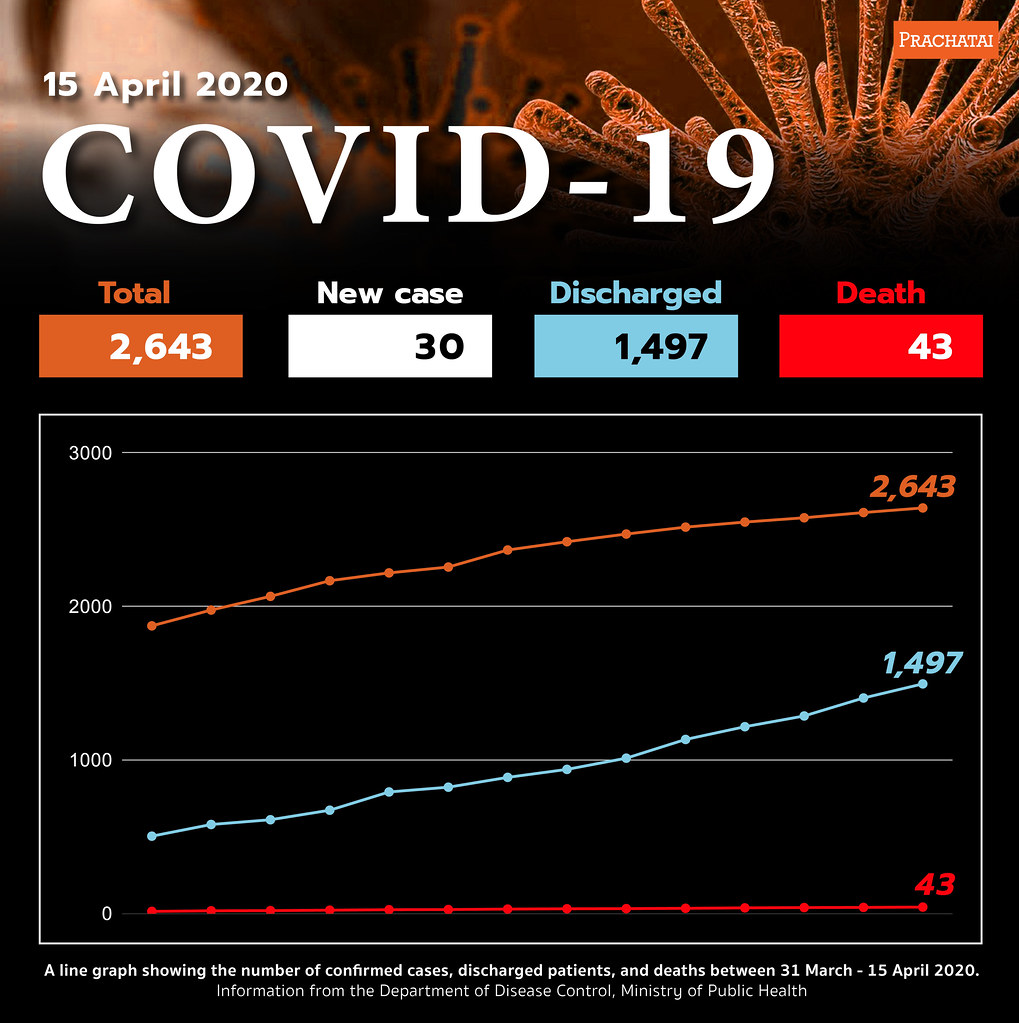11 human rights organizations issued a joint open letter to the Department of Corrections Director-General Pol Col Naras Savestanan calling for the Thai authorities to take immediate steps to release prisoners and ensure the health and safety of all those in detention facilities during the COVID-19 pandemic.

The letter, released yesterday (14 April), states that
"We, the 11 undersigned national and international human rights organizations, express our gravest concern over the potentially disastrous impact of the novel coronavirus (COVID-19) pandemic on the prison population and prison staff in Thailand.
The COVID-19 pandemic provides an opportunity to immediately begin addressing the long-standing issue of overcrowding in places of detention in Thailand. These include prisons as well as immigration detention centers.
With Thailand’s total prison occupancy at over 300% capacity, the implementation of social distancing and other protective measures aimed at ensuring the health and safety of all persons is currently impossible for the 379,190 prisoners (331,405 men and 47,785 women).
We recall that on 27 March 2020, United Nations (UN) High Commissioner for Human Rights Michelle Bachelet urged governments to “work quickly” to reduce the number of people in detention and to take “urgent action” to protect the health and safety of people deprived of their liberty.[1]
Several Asian countries - namely Afghanistan, India, Indonesia, Iran, and Sri Lanka - have already released prisoners from overcrowded places of detention to prevent the spread of COVID-19.
We therefore urge you to take all the necessary steps to immediately release significant numbers of prisoners in order to reduce prison congestion and mitigate the risk of the spread of COVID-19 in correctional facilities. The release of the following categories of individuals, currently detained for non-serious and/or non-violent offenses, should be prioritized:
- Prisoners over the age of 60.
- Sick prisoners, particularly those with underlying medical conditions (such as cardiovascular disease, diabetes, chronic respiratory disease, and cancer).
- Prisoners awaiting trial.
- Prisoners sentenced to terms of up to two years.
- Prisoners with one year or less left to serve.
- Prisoners detained for immigration offenses.
- Pregnant women.
- All others detained without sufficient legal basis.
Those released from detention facilities should undergo adequate medical screening to ensure they receive, if necessary, proper care and follow-up. They may also be subjected to appropriate non-custodial measures, in line with the principles outlined by the Standard Minimum Rules for Non-custodial Measures (the “Tokyo Rules”).
We welcome measures recently introduced by the Department of Corrections to create isolation wards within certain prisons to screen newly admitted prisoners. However, much more needs to be done to ensure that prisoners are not excluded from the enjoyment of the right to health - which includes the prevention, treatment, and control of epidemic diseases. This right is guaranteed “without discrimination of any kind” by Article 2 of the International Covenant on Economic, Social and Cultural Rights (ICESCR), to which Thailand is a state party.
For those who remain in detention, the Department of Corrections must ensure that conditions conform to international standards, such as the Standard Minimum Rules for the Treatment of Prisoners (the “Nelson Mandela Rules”) and the Rules for the Treatment of Women Prisoners and Non-custodial Measures for Women Offenders (the “Bangkok Rules”). In light of the COVID-19 pandemic, particular emphasis must be placed on the implementation of measures related to accommodation, personal hygiene, and healthcare, including gender-specific healthcare.
Symptomatic prisoners and prison staff should receive COVID-19 testing and, if found positive, receive adequate treatment in hospitals equipped for COVID-19 patients. Protective equipment, such as face masks, clean water, soap, and all other items necessary to maintain personal health, hygiene, and cleanliness, should be made available to all prisoners.
Lastly, following the decision by the Department of Corrections to temporarily suspend all prison visits, we urge the relevant authorities to ensure that prisoners are able to maintain regular communication with the outside world. As a matter of priority, the Department of Corrections should put in place alternative measures to physical visitation, through regular electronic and telecommunications between prisoners and family members such as video calls, phone calls, and e-mails.
We call upon you to seriously consider the above-mentioned recommendations and urgently act upon them.
Thank you for your attention to this very important matter.
Sincerely yours,
- ASEAN Parliamentarians for Human Rights (APHR)
- Fairly Tell
- FIDH - International Federation for Human Rights
- Fortify Rights
- Human Rights Watch (HRW)
- Internet Law Reform Dialogue (iLaw)
- Manushya Foundation
- Protection International
- Thai Lawyers for Human Rights (TLHR)
- Union for Civil Liberty (UCL)
- Working Group for Political Prisoners (Thailand)"

As of 15 April Thailand has 2,643 confirmed cases of COVID-19, 1,497 of which have already been discharged from hospital, and a death toll of 43.
Prachatai English is an independent, non-profit news outlet committed to covering underreported issues in Thailand, especially about democratization and human rights, despite pressure from the authorities. Your support will ensure that we stay a professional media source and be able to meet the challenges and deliver in-depth reporting.
• Simple steps to support Prachatai English
1. Bank transfer to account “โครงการหนังสือพิมพ์อินเทอร์เน็ต ประชาไท” or “Prachatai Online Newspaper” 091-0-21689-4, Krungthai Bank
2. Or, Transfer money via Paypal, to e-mail address: [email protected], please leave a comment on the transaction as “For Prachatai English”
